Making your decision to get hearing aids
Every process begins with a decision. The key to success with hearing aids is: that you have decided for yourself that you are ready to get help with your hearing. Have
The post Why are my hearing aids whistling? What is causing that noise? appeared first on Auckland Hearing.
]]>Are your hearing aids whistling? What is causing that noise?
The whistling noise hearing aids may make is called acoustic feedback (often known as feedback). Feedback can sound like a squeal, buzzing, ringing, or a whistle. This sound may be annoying to you, or others around you.
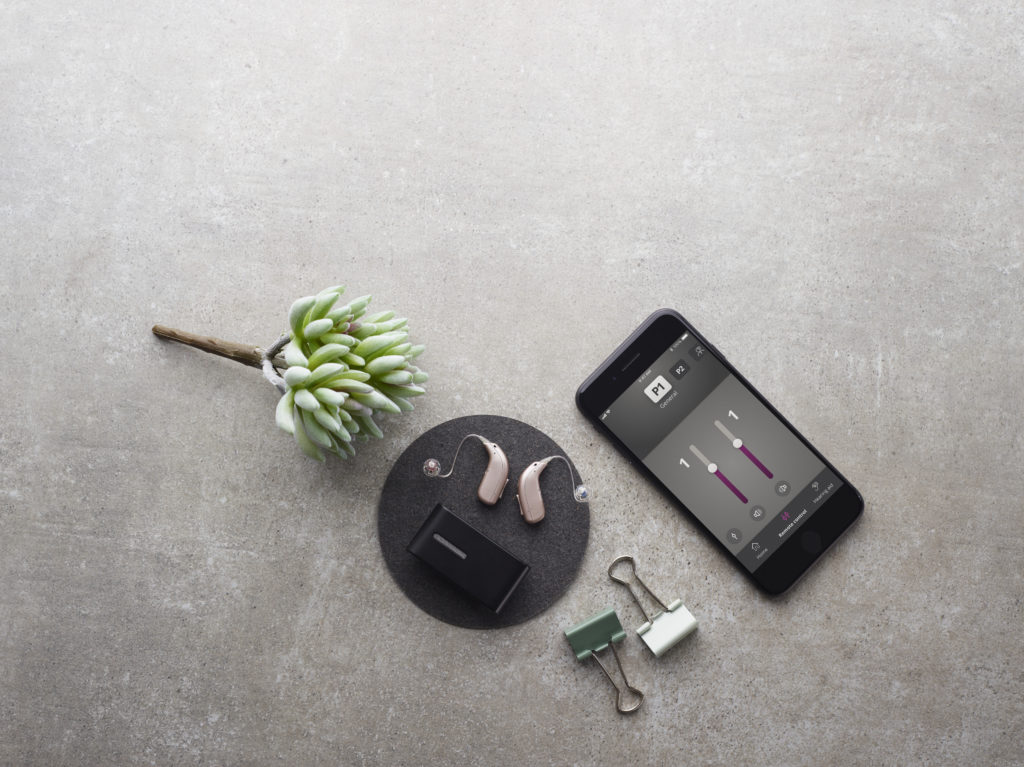
Acoustic feedback or whistling was a common problem in hearing aids until fairly recently. Current hearing aids rarely have issues with acoustic feedback. A lot of innovation has gone into developing programs that manage feedback in hearing aids.
There are just a few special occasions where feedback may become an issue.
Feedback occurs when sound enters the hearing aid microphone, gets amplified and comes out of the receiver (loudspeaker) into your ear. If the sound leaks out of your ear and back in the microphone it creates the feedback loop – reamplifying the same sound and causes acoustic feedback – a whistling sound.

It is unlikely that your hearing aids will whistle when they are first fitted for you. Your Audiologist will check there is no feedback in your hearing aids, many hearing aids have feedback tests and calibrations as part of the setup process. All hearing aids have systems that are designed to remove feedback, many using active feedback cancellation.
Sometimes hearing aids start to whistle over time. Here the reasons that feedback may occur:
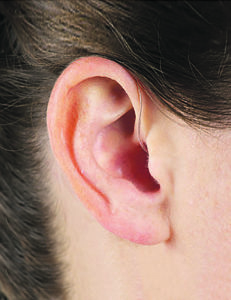
By Car: Auckland Hearing at 66 Michaels Ave is a 2 minute drive (1.6 Kms) off the motorway. Exit the motorway at the Ellerslie Panmure Highway, Michaels Ave is on the left.
Parking: There is plenty of parking on the road directly outside the clinic.
Buses: There are bus stops on Marua Rd and Ellerslie- Panmure Highway, then about a 10-minute walk.
Access: The clinic is accessible on road level and has no stairs. There is wheelchair access.
The post Why are my hearing aids whistling? What is causing that noise? appeared first on Auckland Hearing.
]]>The post Getting Hearing Aids – What is the Process? appeared first on Auckland Hearing.
]]>The first and hardest step for many is the first one, making an appointment for a hearing test. Research has shown it takes people 7 to 10 years to do something about their hearing loss. Of course, while you are getting used to the idea that you may have some hearing loss, you are missing conversations and connections with people every day.
Adapting to hearing loss by changing the way you live your life
When you have hearing loss, the people around you adjust to your hearing loss so they can communicate with you. Friends and family learn they need to speak louder so, they do not have to repeat themselves. As time goes by, they may choose not to share incidental comments. You may start to make different decisions on how you will use your time (like avoiding social situations and communicating less). Hearing loss impacts the way you live your life. There is also a lot of new research showing other long-term effects of hearing loss when it is left untreated.
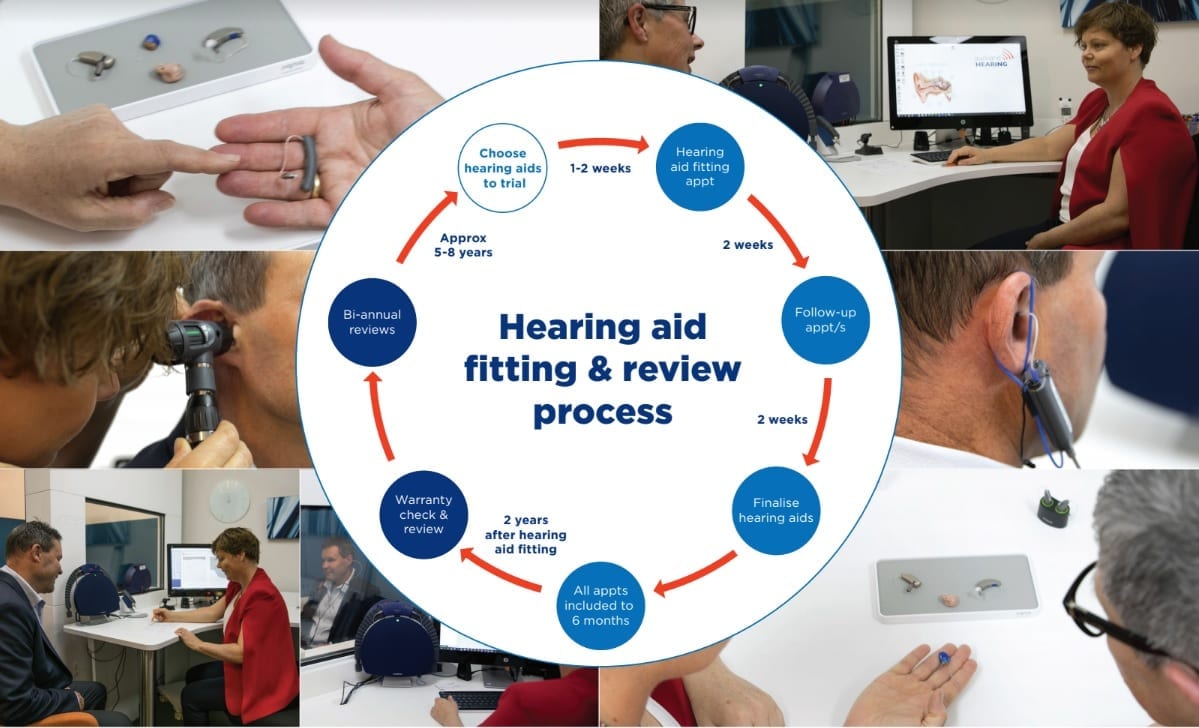
Diagram showing the process an approximate timeline for the life cycle of a pair of hearing aids
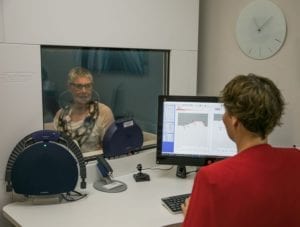
Having a hearing test
The first easy step is to have a hearing test. The hearing test will give you a clearer idea about your type and degree of hearing loss and how this is affecting the way you live your life. For example; your hearing test may explain why you can hear some sounds as well as everyone else; but you can’t follow the conversation when it is noisy. At this point, we will also suggest your options for help with your hearing, and if we need to refer you to a medical specialist, we will look at this point.
The next question is “Do you need hearing aids?”. Your audiologist will let you know if your hearing is in the range where hearing aids will help and your family may also have an opinion on you getting help with your hearing. However, it is essential that once you decide to get hearing aids that you are taking this step for yourself. It is true that other people in your life are probably affected by your hearing loss. However, it is better for everyone if getting hearing aids is your choice.
A full diagnostic hearing test will clarify your hearing levels and help identify possible causes of your hearing loss.
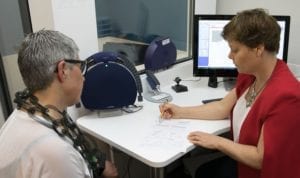
Explaining the hearing test
Your Audiologist will discuss your test results. If there is hearing loss, we will let you know why it is affecting your ability to understand people speaking; even though you can hear some sounds easily. At this point, we will refer you on to any other professionals, for further assessment or management, if needed.
If you are interested, we will tell you a bit about hearing aids and possible options that might suit you. You can even have a listen through some hearing aids.
Once you have decided to learn more about hearing aids, we will go through your needs assessment process. We will ask you questions about your lifestyle and hearing challenges. From here, we can decide on the hearing aid features and level of technology that suits you best. At this point, we create a list of situations where you would like to hear and communicate better. When choosing hearing aids for you, we take into account your:

Finding out about your hearing needs
Once you have decided to trial hearing aids, the process usually takes four to six weeks. The eight-week trial period allows you to be confident that you hear well with your hearing aids in various listening environments. Depending on your type and degree of hearing loss, it takes a few days to a few weeks to adjust to hearing sound again. Eight weeks is plenty of time for you to go through the adaptation process and get used to your new hearing aids.
Hearing aids are always paid for in full before taking them home. If you decide that hearing aids are not for you, you can hand them back within the eight-week time frame. If you do, you will be refunded the cost of the hearing aids minus the deposit (which covers some of the time we spent with you). We also have the option of changing to other hearing aids at this time if needed.
Our main goal at the fitting is to get you comfortable with the sound and management of your new hearing aids. We will:
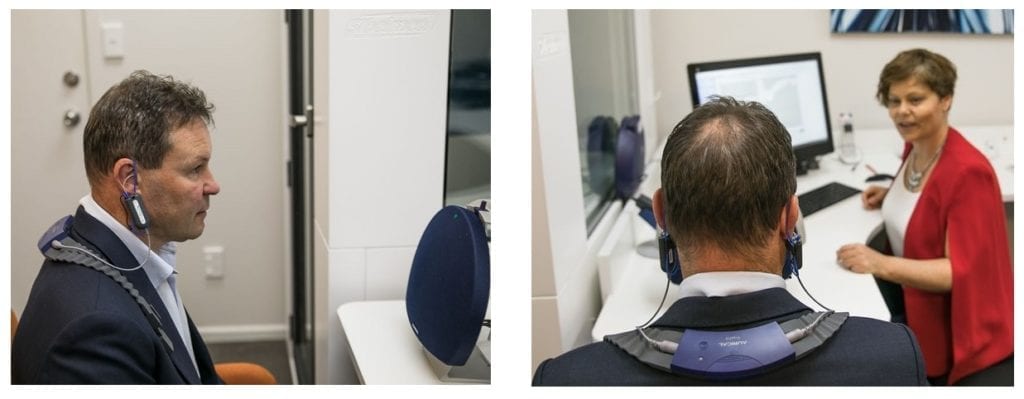
Hearing aid fitting – with real-ear measures
Follow up appointments allow us to check how you are going with the hearing aids and make adjustments, as required. Usually, people have got used to the initial settings of the hearing aids and are ready for a clearer sound. The number of follow up appointments required will vary for different clients.

Follow up appointments
Finalising means that you are happy with your hearing aids and have decided you want to keep them. We will not schedule another appointment at this time. However, you are welcome to contact us again if you have further questions or need adjustments to your hearing aids.
We include all the appointments up until 6 months in your initial fitting fees. That way, we can make sure your hearing aids are working well for you.
Warranty repairs
It is worth having your hearing aids sent off for a check over before your warranty expires. We will contact you before your warranty expires, so you can bring your hearing aids in and we will send them off. In many cases, the hearing aids are replaced or repaired under warranty, giving you refurbished hearing aids moving forward.
Bi-annual hearing test and hearing aid adjustment appointments
We will send you an email each year, asking how you are going with your hearing aids. Every two years, we will recommend a bi-annual review. We recommend you have a hearing test and hearing aid adjustment every two years, or sooner if you notice a change in your hearing. At your hearing test and hearing aid adjustment appointment, we will test your hearing and adjust your hearing aids to your current hearing levels.
We will also check your hearing aids over and make sure they are working as they should. If your hearing aids are not working as expected, we will send them off for repair. These appointments ensure you continue to hear as well as possible with your hearing aids.
Maree contacted me recently, and I went in for another check where she gave my hearing aids a tune-up to maintain their efficiency. With my slowly deteriorating hearing, I hadn’t noticed I didn’t hear as clearly as before. I was surprised at how much more I could hear once my hearing aids were adjusted. Excellent service indeed!
Traditionally hearing aids lasted about 4-5 years as they would be affected by wax, moisture, dust and dirt. Now, most hearing aids are covered by high tech coatings that make them much more resistant to moisture.
Hearing aid lifetime – It is not possible to tell how long these current aids will last but with proper care possibly 6-8 years. You will need regular hearing assessments and adjustments over that time to keep them working the best for you.
Insurance – Please list your hearing aids on your insurance policy just in case they get lost or something happens to them.
As an Auckland Hearing client, you will become part of our Auckland Hearing community. As long as you are interested, we will keep you up to date about the hearing world from hearing care to the latest hearing aids.
Please feel free to browse among the other articles about hearing loss and hearing aids.
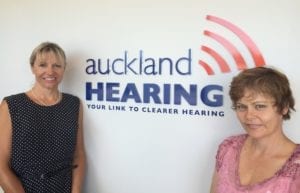
Anna and Maree – At Auckland Hearing
Auckland Hearing is an independent hearing aid and audiology clinic set up by Maree O’Sullivan. Maree
has worked in Audiology for nearly 25 years and started Auckland Hearing so she could focus on the needs of each client (rather than corporate profits).
We provide a full range of hearing services and work with all of the Ministry of Health approved hearing aid brands in New Zealand. This means we can fit the hearing aids that best suit your needs.
The post Getting Hearing Aids – What is the Process? appeared first on Auckland Hearing.
]]>The post Making your decision to get hearing aids appeared first on Auckland Hearing.
]]>
The key to success with hearing aids is: that you have decided for yourself that you are ready to get help with your hearing.
Have you observed or decided some or all of these:
And that you want to do it for you – not to please someone else.
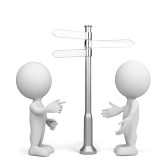
Over the years that your hearing has been gradually changing, so has your brain. The hearing part of your brain has been receiving less sound input, so it has had less information to process. It has forgotten what to do, as it hasn’t had to work so hard. Other parts of your brain have been working harder to try and keep up with the conversation. You need to use context and visual cues to work out what is being said. This can cause auditory fatigue or tiredness at the end of the day.
Luckily, once we provide that missing sound to your hearing system with hearing aids, your brain can begin to use the information again. Brain plasticity means you can relearn and rewire. Just like when we start on a new exercise program; when we get hearing aids, we need to start slowly and rebuild our “hearing muscles”. As long as it hasn’t been too long and your hearing loss is not too severe, your brain plasticity will mean you will relearn to process the sounds you have been missing and usually, we can get most of your hearing functionality back.
 Luckily, hearing aids now have an excellent sound quality, and you will adjust very quickly as long as you wear them all the time and get used to hearing again. Within half an hour, sounds that seemed strange or new when you first put on the hearing aids will begin to normalise.
Luckily, hearing aids now have an excellent sound quality, and you will adjust very quickly as long as you wear them all the time and get used to hearing again. Within half an hour, sounds that seemed strange or new when you first put on the hearing aids will begin to normalise.
The key to real success with hearing aids is continual use. You must be ready in yourself to get hearing aids, so you embrace the process for maximum benefit. We want to create a new normal – Normal to hear.
To create a new normal, we are going to ask you to wear your hearing aids as much as you can, from the time you wake up in the morning until you go to bed at night. At first, you may find it tiring. Your brain will have to work hard to process the extra sound that it had forgotten about over the last few years. By the end of the first two weeks, you should be at the point where you can wear your hearing aids all day every day. By the time you finalise your hearing aids, it will feel normal for you to hear.
Usually, we begin the hearing aid fitting process by working out how much sound you require to compensate for your hearing loss, then turning the hearing aids down. The goal at the first fitting is to get the sound comfortable. We want you to wear the hearing aids as much as possible, giving your brain time to adjust to the new sounds. We then gradually turn the sound up over time. This process gives your brain time to adapt and change, keeping sound comfortable at the start and increasing the clarity over time.
You must decide that you need hearing aids for yourself. Once you have chosen to improve your hearing, there will be a short adaption process to go through as you adjust to hearing again.
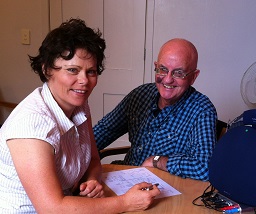
Max Ross
Auckland City
When you come along for your hearing assessment appointment, we will talk to you about your hearing loss and how it is affecting your life. We will present options to help with your hearing (if required). After this appointment, you will have time to think about and notice those effects as they happen in your everyday life.
You will know when you are ready to take action. You will be ready to:
Ready Now? Follow this link to book your appointment.
Once you have decided to get hearing aids, please give us a call and we will make you an appointment.
Or read on to the next article to find out more about the process of getting hearing aids.
Auckland Hearing is an independent hearing aid and audiology clinic set up by Maree O’Sullivan. Maree
has worked in Audiology for nearly 25 years. She started Auckland Hearing so she could focus on the needs of each client (rather than corporate profits).
We provide a full range of hearing services and work with all of the Ministry of Health approved hearing aid brands in New Zealand. This means we can fit the hearing aids that best suit your needs.
The post Making your decision to get hearing aids appeared first on Auckland Hearing.
]]>The post A hearing journey – Your path to hearing again appeared first on Auckland Hearing.
]]>Your Hearing Journey – The path to hearing again
The post A hearing journey – Your path to hearing again appeared first on Auckland Hearing.
]]>The post What is that ringing in my ears? appeared first on Auckland Hearing.
]]>Tinnitus is the name given to sound or noise heard in the head that does not come from an external source. Tinnitus comes from the Latin word tinnire which means “to ring”, but not everybody will hear their tinnitus as a ringing sound. Some people describe a buzzing, hissing, humming, or chirping sound, while others may even hear it as music! Tinnitus can range in volume and pitch and can be heard in one or both ears or in the head. Some people describe more that one sound and the sound can come and go or vary in intensity.
Tinnitus is a symptom and not a disease, and there are various underlying causes. Common causes are hearing loss or earwax build-up; tinnitus can also be due to head injuries or can even originate in the jaw or neck.
The most common type of tinnitus is Subjective Tinnitus. This is awareness of sound in the head or ears in the absence of any corresponding external sound. Objective Tinnitus – is when sounds are generated from within the body and can be heard by an external examiner. These sound may be generated by blood flow or muscle movement, or the opening and closing of the eustation tube, they are also known as Somatosounds.

Most people will experience tinnitus at some time in their lives, in fact, it has been said that nearly everyone hears tinnitus if they are in an anechoic chamber (very quiet room). If the tinnitus lasts for less than 5 minutes and shows no particular pattern, then it may not be significant clinically. Think of it as a one-off twitch in your eyes.
Tinnitus may seem like it is coming from your ears, but it usually originates in the brain. Tinnitus can be influenced by attention, emotions, and stress.
Tinnitus can be heard by at least 98% of people in a quiet room. People with no detectable hearing loss may experience tinnitus; although it is most common when some temporary or permanent hearing loss is present. About 20% of the population report experiencing tinnitus on occasion with around 1% experiencing significant annoyance from their tinnitus.
What Causes Tinnitus?
Awareness of tinnitus often follows a change in the function of the regions of the brain associated with attention or emotion, or it may occur after a change in the hearing system. Here are some common causes of tinnitus:

Some details of how tinnitus occurs are still unclear, but we do know why it occurs when there is a hearing loss. Current research suggests the phantom sound is not generated in the ear but from neurons and the brain. Your brain has a memory of what things should sound like (called auditory memory).
When the brain notices a reduced or degraded input of sound due to hearing loss, it tells the nerves that send the signal from the ear to the brain to work a bit harder. It is believed that this generates the phantom sound.
If a person focuses on their tinnitus and thinks of it in a negative way, then a strong emotional association can occur. This may make the tinnitus more debilitating. So focusing and worrying about the tinnitus makes it more likely it is to become an overwhelming problem.

In the past, some tinnitus sufferers have been told “there is nothing you can do”, or you just have to live with it”, that is not true. There are strategies to help you manage your tinnitus and reduce the level of intrusiveness.

Tinnitus is a common symptom that can occur with and without hearing loss. The best way to manage tinnitus is to give it a very low priority, attending to it as little as possible. When you first notice tinnitus, it is worth seeing your Audiologist to get a better understanding of your tinnitus and to rule out any underlying causes that may need a further referral. If you have hearing loss, hearing aids may help to restore the internal volume in your brain and reduce the tinnitus. Otherwise, reducing stress and calming your autonomic nervous system with medication as well as avoiding very quiet environments may help you live in harmony with your tinnitus.
Are your hearing aids whistling? What is causing that noise? Acoustic feedback in current hearing aids The whistling noise hearing aids may make is called acoustic feedback (often
5 Steps to hearing aids The first and hardest step for many is the first one, making an appointment for a hearing test. Research has shown it takes people 7 to 10 years to
Every process begins with a decision. The key to success with hearing aids is: that you have decided for yourself that you are ready to get help with your hearing. Have you observed or decided some
Your Hearing Journey - The path to hearing again Hearing loss, hearing aids & making your decision Hearing loss, getting and then wearing hearing aids has been described as
Tinnitus – where is that sound coming from? Tinnitus is the name given to sound or noise heard in the head that does not come from an external source.
Did you know that hearing loss is linked to memory loss and dementia Hearing loss is widespread, and it affects people of all ages. There are
The post What is that ringing in my ears? appeared first on Auckland Hearing.
]]>The post Did you know that hearing loss is linked to memory loss and dementia? appeared first on Auckland Hearing.
]]>Did you know that hearing loss is linked to memory loss and dementia
Hearing loss is widespread, and it affects people of all ages. There are many reasons for hearing loss including hereditary factors, noise exposure, trauma and ear disease. Hearing loss becomes more common as we age. Research shows increased severity of hearing loss correlates to increased memory loss and dementia.
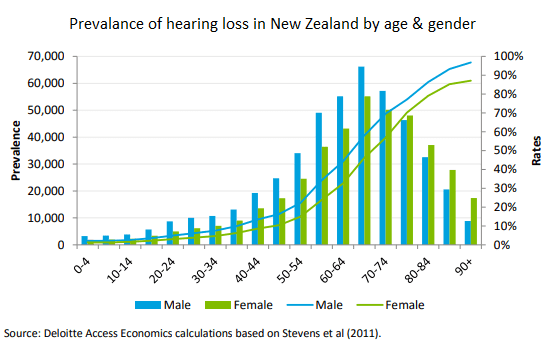
Prevalence of hearing loss in New Zealand
This graph shows the results from a study by the National Foundation of the Deaf called Social and economic costs of hearing loss in New Zealand (published in December 2016).
Hearing loss is usually gradual. In the beginning, the hearing loss takes away the beginning of the sentence, the little details and the punchline. With time hearing loss may increase mental fatigue – as you concentrate harder to follow along. It can begin to erode your confidence – as you are no longer sure about what was said and it can lead you to feel embarrassed about missing the details or about having to ask for repeats too often.
The gradual nature of hearing loss means that we adapt over time. We change our behaviour, we choose our environments, and slowly our relationships change as everyone adjusts to a change in our hearing. Often hearing loss leads people to socialise less, which can lead to less overall activity. Hearing loss is also linked to memory loss and dementia (or cognitive decline).
In 2013, Frank R. Lin, MD, PhD conducted a study on the topic of hearing loss and cognitive decline. The study observed 1,984 adults over six years. They tracked the progression of their hearing loss and cognitive function. He found there is little doubt that hearing loss is a factor affecting the loss of mental acuity in older adults.
The study found that people with more severe hearing loss had a higher likelihood of developing a cognitive disorder, and an increased decline in mental function. Even subjects with mild hearing loss were found more likely to experience cognitive difficulties like memory loss and dementia; it is also linked to increased falls.
The exact link between hearing loss and cognitive decline is not yet fully understood, and current studies are focusing on this question. It is possible that is due to increased “cognitive load”, where the brain is overwhelmed with demands on its limited resources. Concentrating hard to follow a conversation means we have fewer resources for other things like memory and maintaining balance.
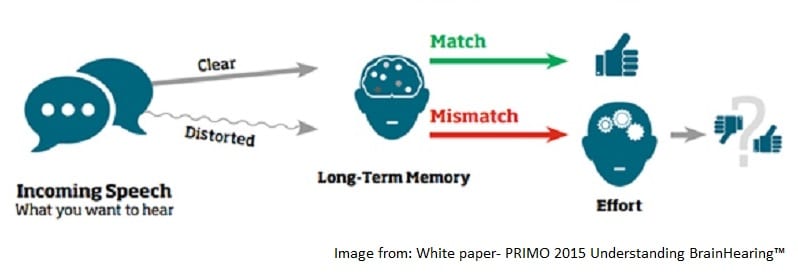
Hearing loss, memory loss and dementia
“Communicating when you have a hearing loss, takes up a lot of brain power. It’s a bit like a computer that runs slower when there is a large program running in the background,” says Maree O’Sullivan, Audiologist from Auckland Hearing.
There is evidence that the part of the brain that was used by the hearing system gets reallocated and is used by the visual system in people with hearing loss. “Declines in hearing abilities may also accelerate grey matter atrophy and increase the listening effort necessary to comprehend speech. Hearing aids may not only improve hearing but preserve the brain,” said Dr Lin.
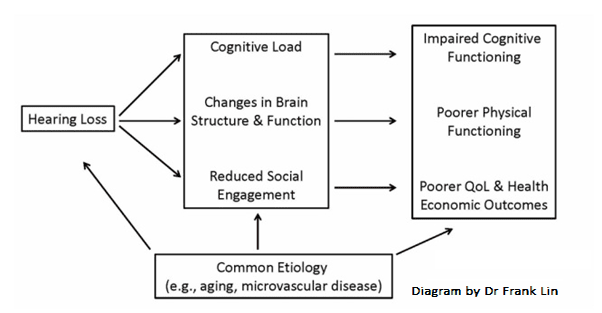
How hearing loss may effect hearing
As evidence continues to mount that hearing loss is a contributing factor in the development of memory loss and dementia, it is imperative to consider the profound consequences of ignoring hearing loss. People with hearing loss on average wait ten years before they seek treatment for hearing loss; even though the sooner hearing loss is detected and treatment begins, the more hearing ability (auditory brain function) can be maintained.
Research has shown that people that wear hearing aids do not show the same cognitive decline as those who don’t. However, although there is a definite co-relation, Dr Frank Lin and his team are not prepared to assume causation, meaning that we can not assume that wearing hearing aids reduces cognitive decline. Reduced cognitive decline that is measured may be due to other factors, for example, education levels or socioeconomic factors that may lead some people to get hearing aids and others to choose not to. A very large study is currently underway by Frank Lin and his team to clarify whether wearing hearing aids protect from memory loss and dementia when taking into account other factors.
At Auckland Hearing, we see positive change in our clients after they get hearing aids, anecdotal evidence that hearing aids keep you active. We often measure improvement in our client’s ability to understand speech (using speech perception testing), once people with hearing loss start wearing their hearing aids all day every day. Human brains have plasticity which means they are continually adapting. Once people retrain their brain by exposing it to sound every day, they hear better and can be more involved in the world around them.
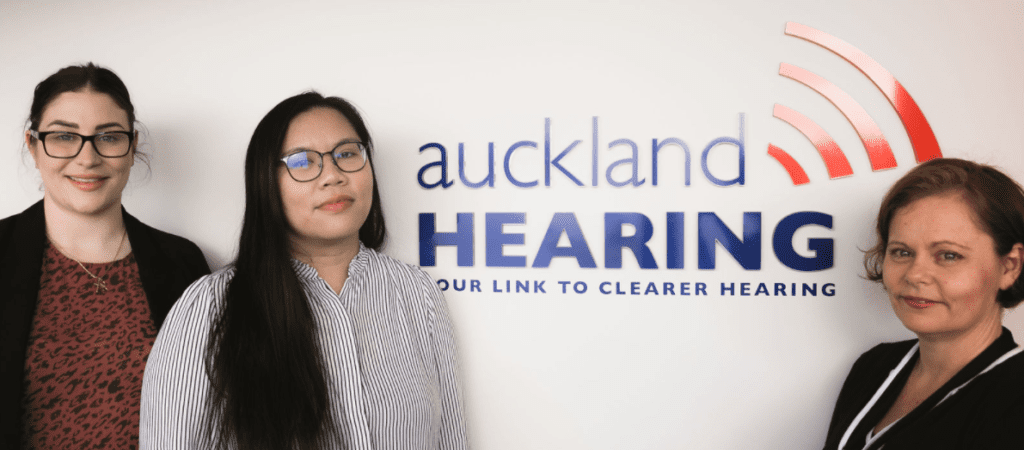
Auckland Hearing Team
Auckland Hearing is an independent hearing aid and audiology clinic set up by Maree O’Sullivan. Maree has worked in Audiology for nearly 25 years and started Auckland Hearing so she could focus on the needs of each client (rather than corporate profits).
We provide a full range of hearing services and work with all of the Ministry of Health approved hearing aid brands in New Zealand. This means we can fit the hearing aids that best suit your needs.
The post Did you know that hearing loss is linked to memory loss and dementia? appeared first on Auckland Hearing.
]]>The post ACC hearing aid funding – Included products and services appeared first on Auckland Hearing.
]]>ACC provides “comprehensive, no-fault personal injury cover for all New Zealand residents and visitors to New Zealand. This means you can apply for our help, no matter how you got injured, or whose fault it was” – ACC website
ACC has been covering the cost of hearing habilitation for people who have hearing loss due to workplace noise or other accidents since the scheme began in 1974. Until 2011, ACC covered all costs associated with noise-induced hearing loss. The system was changed and they have since contributed a smaller amount towards hearing devices and services. In July 2014, ACC again reviewed their funding, and here we outline the current ACC hearing loss regulations and how it will help those with hearing loss due to noise or accident.
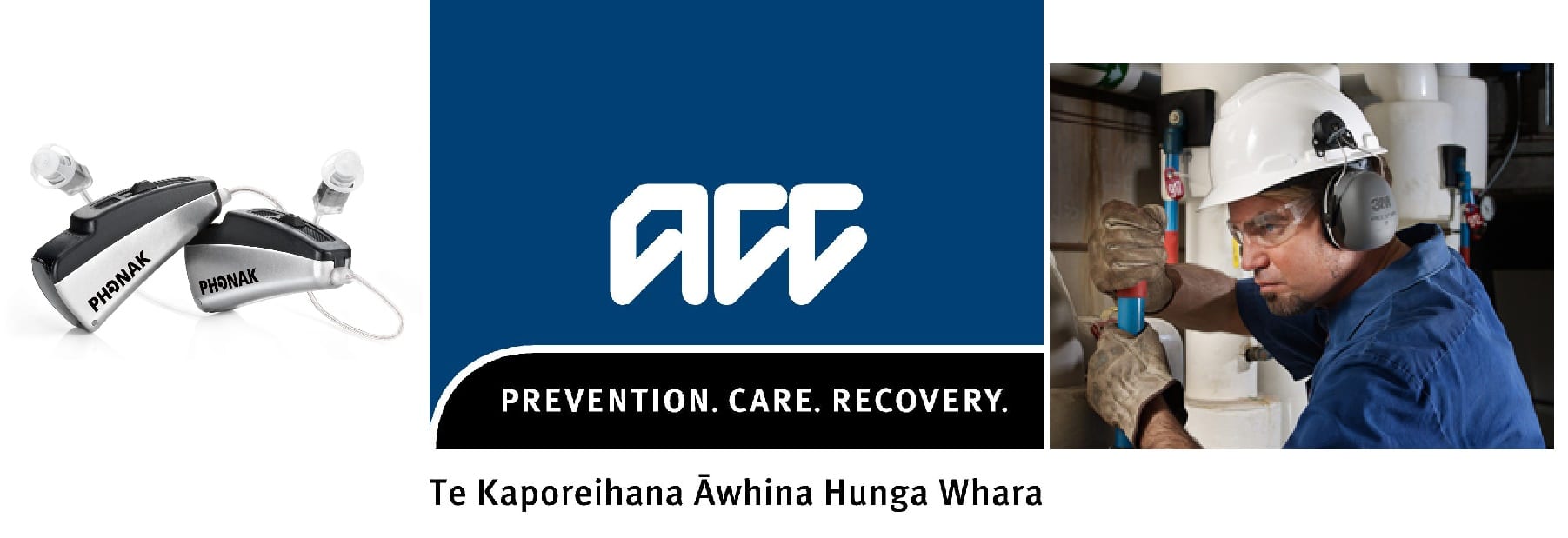
A second device consultation – ACC covers the cost of a second appointment with another hearing clinic or Audiologist to assess your needs and the best solution for you. This means that if you are not comfortable with your first recommendation for any reason, for example – the price; you have the flexibility to seek other options.
ACC covers the cost of repairs up to the maximum of $234.09 for each aid within a two year period, once the warranty has expired.
Ear moulds – ACC contributes to the cost of new ear moulds, if they are needed, throughout the hearing aid lifetime.
The level of ACC hearing aid funding for each claimant is decided by assessing each individuals situation and attributing how much of the hearing loss is due to the accident or noise exposure.
Level 1 – $ 3157.90 (incl GST)
Level 2 – $3904.40 (incl GST)
Level 3 – $4953.05 (incl GST)
Level 1 – $ 1873.35 (incl GST)
Level 2 – $2247.10 (incl GST)
Level 3 – $2770.93 (incl GST)
ACC has increased the ongoing support of hearing aid wearers by increasing the amount they contribute to:
You will still need to contribute to the cost of your:
ACC will consider a new claim for hearing aid funding after six years. ACC will determine the amount of funding based on the nature of your hearing loss and whether they consider the cause was workplace noise or an accident. In most cases, you will be required to see an ear nose and throat specialist (ENT / ORL) to determine the cause of hearing loss.
Once accepted for new ACC hearing aid funding allocation, you will receive:
Applying for ACC funding:
Here is a link to the ACC website with more details.
Before January 2011 ACC covered the full cost of hearing aids and accessories, batteries, repairs, as well as annual hearing assessments and hearing aid adjustments. This meant that ACC claimants got first class service. ACC claimants could get hearing aids that met their needs as well as excellent follow-up and maintenance, all covered by ACC.
Unfortunately, as the ACC claimants increased in numbers, due to better technology and more hearing loss among people who work in noise (who had historically not protected their hearing), the cost became too high for ACC to maintain.
In early 2011 the ACC hearing loss policy was changed in a number of ways including:
It also resulted in many ACC claimants being unable to afford the hearing aids that would best meet their needs. Some previous hearing aids wearers had to either go without hearing aids or get very basic hearing aids, increasing the effect of their hearing disability and their ability to function in their normal listening environments. In 2014, they increased the funding allocation making hearing aids more affordable for clients.
ACC Noted:
“The Ministry and ACC are concerned that people are not accessing the services and devices available to help them manage their hearing loss. People who suffer from injury-related hearing loss must be able to access the hearing services and devices they are entitled to in order for them to fully participate in employment, education, their community, and enjoy an improved quality of life. Hearing loss often leads to social isolation and depression.
The Ministry’s and ACC’s main objective is that services must be affordable and easy to access. In this case, more people need to be accessing the hearing loss services and devices they are entitled to so that people suffering from injury-related hearing loss can fully participate in society.
Auckland Hearing is a small independent clinic. This means that our overheads are low and therefore our pricing is very competitive. If you are looking for great service as well as competitive pricing while getting your new ACC hearing aids you are welcome to come along for a second opinion and pricing comparison.
Follow this link to see more details of our hearing aid fitting process…
The post ACC hearing aid funding – Included products and services appeared first on Auckland Hearing.
]]>The post Hearing Aid Technology and Innovation appeared first on Auckland Hearing.
]]>
Like computers, tablets and phones, innovations in hearing aid technology is improving quickly. Hearing aids have more and more functions and features which fit into tiny packages that sit in or behind your ear. Current hearing aids do more than compensate for hearing loss with amplification. They are small computers that measure your sound environment then modify the way they amplify to maximise your hearing clarity.
When getting hearing aids, we need to consider the technology level and functionality that will best compensate for your hearing loss. There are also other features and additional connectivity technology you might find useful to make life easier.
Excellent core hearing aid functionality is key to success. Choosing the correct level of amplification, fitting to your ear and technology level for your hearing needs must be guided carefully by your Audiologist. Follow this link for more details about how we go about assessing your listening needs.
Once we have decided on the right hearing aid technology for you, we can consider the added features that are available. These can help with ease of use, connectivity and better hearing in specific listening environments. These features are available at most technology levels. Once we have decided on the right hearing aids for you, we can determine the technology level to go along with them.
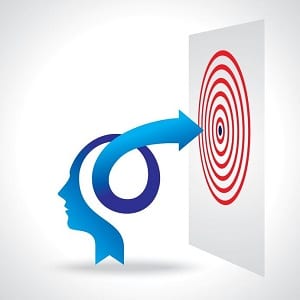
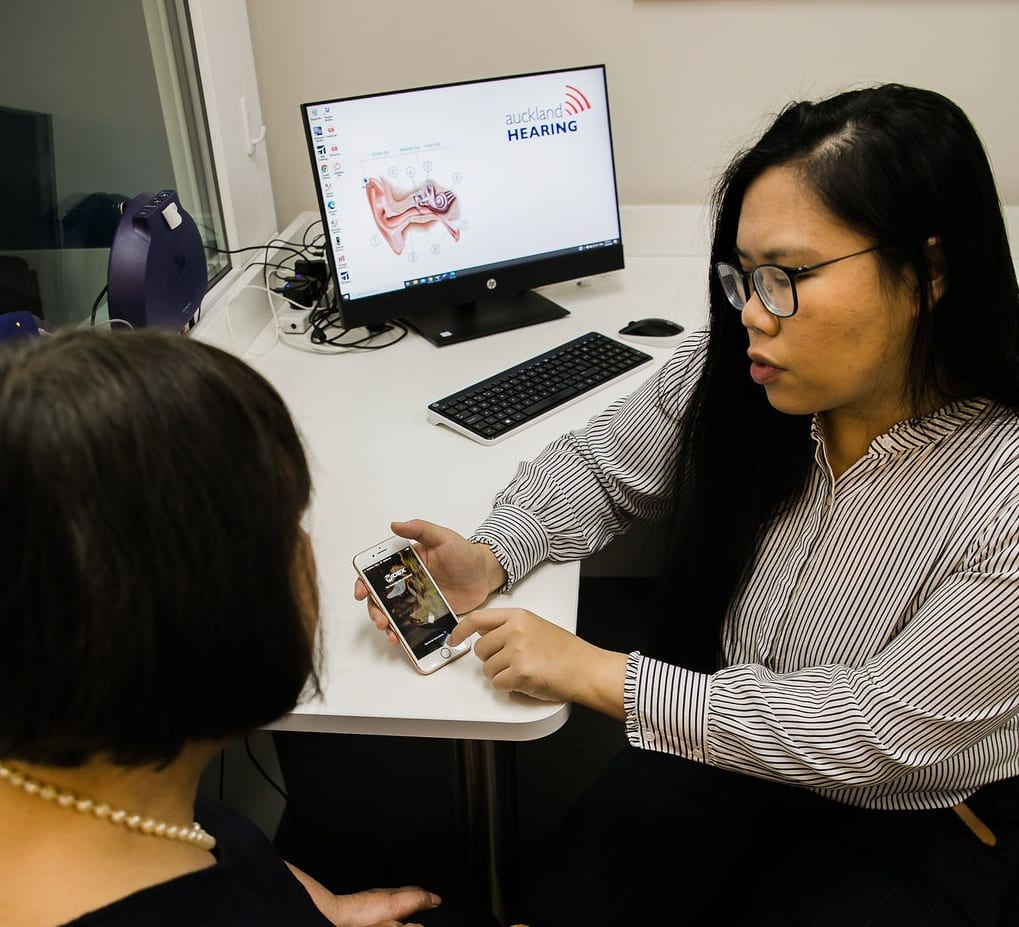
In an ideal world, hearing aids measure the sound environment, highlight the sound you want to hear and bring it to you with increased clarity. In most cases, hearing aids do this well. However, at times, you may wish to adjust the hearing aid sound for the environment you are in. You may want to appreciate the nuances of music, hear the person who is speaking from behind you, like in a car; or understand better in a particularly reverberant (echoey) room.
In these cases, you may want to change the way the hearing aids are working; adjust the volume or focus on sound in a particular direction. These are the situations where a remote-control app may come in handy. Apps usually give you the option to change your hearing aid volume, program setting and, in some cases, pitch and adjust how the hearing aids respond in noise.
Rechargeable batteries in hearing aids have been available for several years. Within the last year, we have seen a surge of new rechargeable hearing aids from more manufacturers with improved battery life. The three main reasons to choose rechargeable hearing aids:

New hearing aids from Starkey and Oticon can now work as a fitness tracker, measuring the steps you do each day. Some hearing aids have inbuilt systems to keep you active both physically and cognitively. Features released in 2019 in by Starkey are:
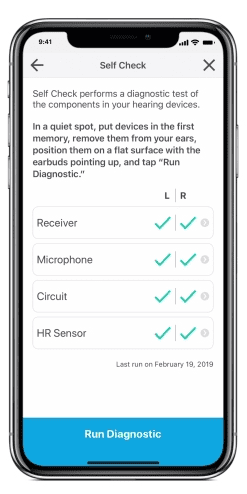
Hearing aids self check lets you know if you hearing aids are working as expected. When the hearing aids are new, we run a check in the office. Then at anytime this test can be rerun with the results compared to the initial test. The hearing aids will let you know if they are working as expected or if they are not working correctly which part of the hearing aids needs to be repaired. The microphone, amplifier or receiver (loud speaker). This allows for accurate trouble shooting and keeping your hearing aids working as expected at all time.
One of the biggest challenges for people with significant hearing loss is hearing across distance. Speech understanding can be difficult over more than a few meters, even the best hearing aid technology. Another built-in advantage of the connectivity is that you can use your phone as a remote microphone. Just put your iPhone at the other end of the table or give it to the person with the quiet voice. The sound that reaches the iPhone microphone (or a connected remote microphone) and will be sent directly to your hearing aids.
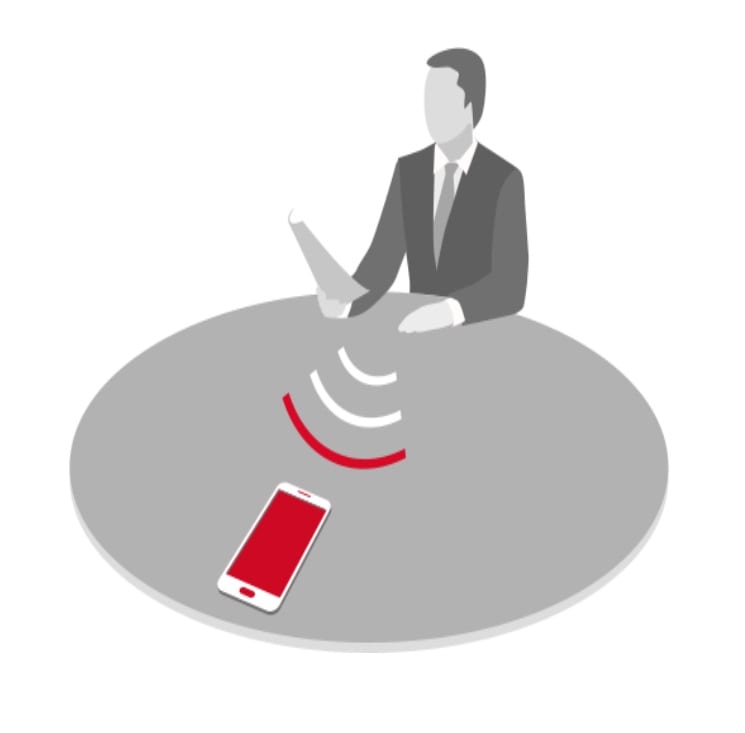
For some people getting into the clinic to see your audiologist can be a challenge. Maybe you live a long way from the clinic, are not able to get to appointments during work hours or are homebound, for medical or transport reasons. If this describes you, then we have a solution – Telecare audiology is now a reality.
Tele-audiology means that some of the hearing aid fitting process can be delivered from the comfort of your home or office. Once we have done a thorough hearing assessment and have fitted the hearing aids in the clinic (using real ear measures), we can do further follow-ups from a distance. All you need is a smartphone, and your hearing aids can be adjusted over the internet. Being able to customize your hearing aids from the comfort of your home makes the process of getting hearing aids more manageable than before.


Finding the most discrete hearing aids is a priority for many new hearing aid users. Cosmetics, of course, has to be balanced with comfort, reliability, sound quality and functionality (hearing well in more complex situations). Some of the smaller hearing aids, look great and may be able to compensate well for your hearing loss, but may not work as well as other styles in difficult listening situations.
The most commonly fitted style of hearing aids in recent times is the Receiver In the Canal (RIC), also known as the Receiver In The Ear (RITE) / (RIE). These hearing aids have a relatively small hearing aid that sits behind the ear, the receiver (loudspeaker) that sits in the ear.
These hearing aids are discreet, comfortable. and easy to wear. If there is a change in hearing levels, the receiver can be changed easily to a more powerful loudspeaker, in the clinic. Or if the receiver breaks down, it can be replaced in the clinic with less hassle (at a significantly lower repair cost). Receiver in the canal hearing aids can be worn with universal fit domes or custom moulds.
There are also many behind the ear styles available with various tubing options for those with more significant hearing loss or other specialise hearing needs.
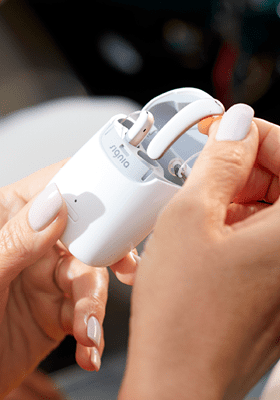
Some people prefer not the have anything sitting behind their ear. There are various size options available to match your priorities, including Invisible in the Canal (IIC) hearing aids, Completely in the Canal (CICs) and In the Ear (ITE) hearing aids. Most brands have these hearing aid styles available.
ITE hearing aids have historically come with trade-offs in comfort and reliability. Having an electronic device deep inside your ear means more problems with moisture and wax; these issues improved dramatically over the past few years. There are many in the ear styles available.
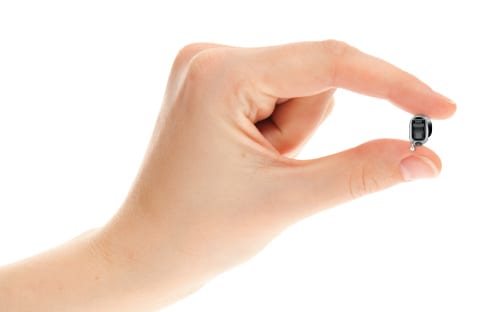
In my experience, most people like milk with their tea. Some people enjoy sugar in their coffee. Sometimes I prefer herbal tea.

Significant research and development in hearing aid technology means new hearing aids are being released almost continually. As you can see, there are many options to be considered when choosing hearing aids. It is essential to consider how you would like your hearing aids to work for you. Our needs assessment will help steer you in the right direction to get the hearing aids that suit your lifestyle and listening needs best. Finding out about your preferences is an integral part of choosing the best hearing aids for you.
At Auckland Hearing, we keep up to date with new developments from all the manufacturer’s product lines. This is so we can choose the most up to date hearing aids that are best suited to your needs.
Are your hearing aids whistling? What is causing that noise? Acoustic feedback in current hearing aids The whistling noise hearing aids may make is called acoustic feedback (often
5 Steps to hearing aids The first and hardest step for many is the first one, making an appointment for a hearing test. Research has shown it takes people 7 to 10 years to
Every process begins with a decision. The key to success with hearing aids is: that you have decided for yourself that you are ready to get help with your hearing. Have you observed or decided some
Your Hearing Journey - The path to hearing again Hearing loss, hearing aids & making your decision Hearing loss, getting and then wearing hearing aids has been described as
Tinnitus – where is that sound coming from? Tinnitus is the name given to sound or noise heard in the head that does not come from an external source.
Did you know that hearing loss is linked to memory loss and dementia Hearing loss is widespread, and it affects people of all ages. There are
The post Hearing Aid Technology and Innovation appeared first on Auckland Hearing.
]]>The post ACC hearing aid batteries – how to order batteries for ACC funded hearing aids appeared first on Auckland Hearing.
]]>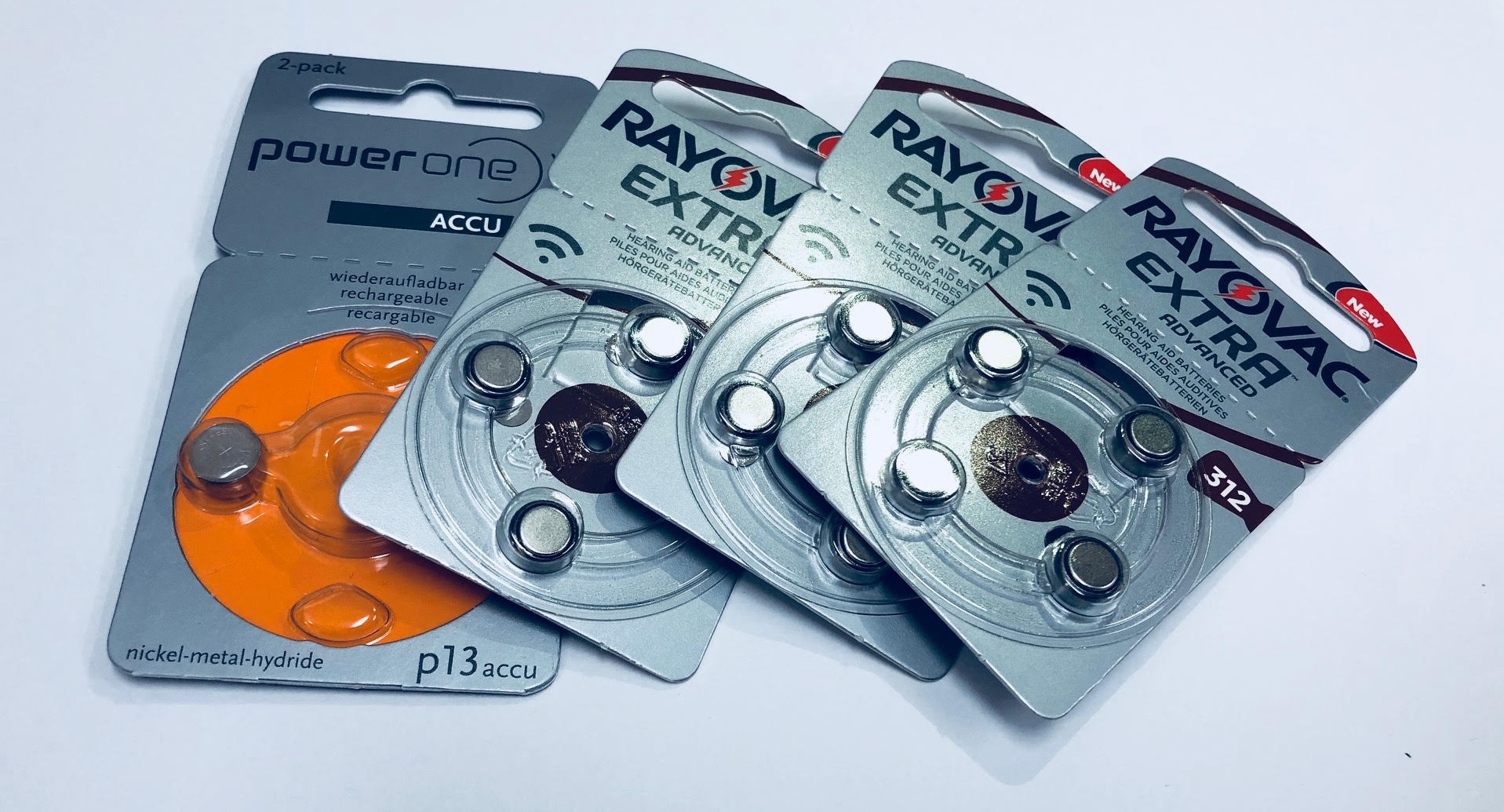
When you finalised you hearing aids your Audiologist sent in a battery request form for your ACC hearing aid batteries. ACC knows the size and type of batteries you need. The quantity of batteries you are expected to need is also on file and they are allocated to you each 6 months or so.
Time needed: 5 minutes.
When you need new batteries you can order more in the following ways:
Fill in your ACC number and your date of birth and then order more batteries
Freepost 225409
ACC Battery request
PO Box 62253
Sylvia Park
Auckland 1644
by phoning Community client direct on 0508 222 546.
Or for any other questions about ordering your ACC hearing aid batteries or more information about your hearing loss claim contact the ACC Hearing Loss team on 0800 101 996.

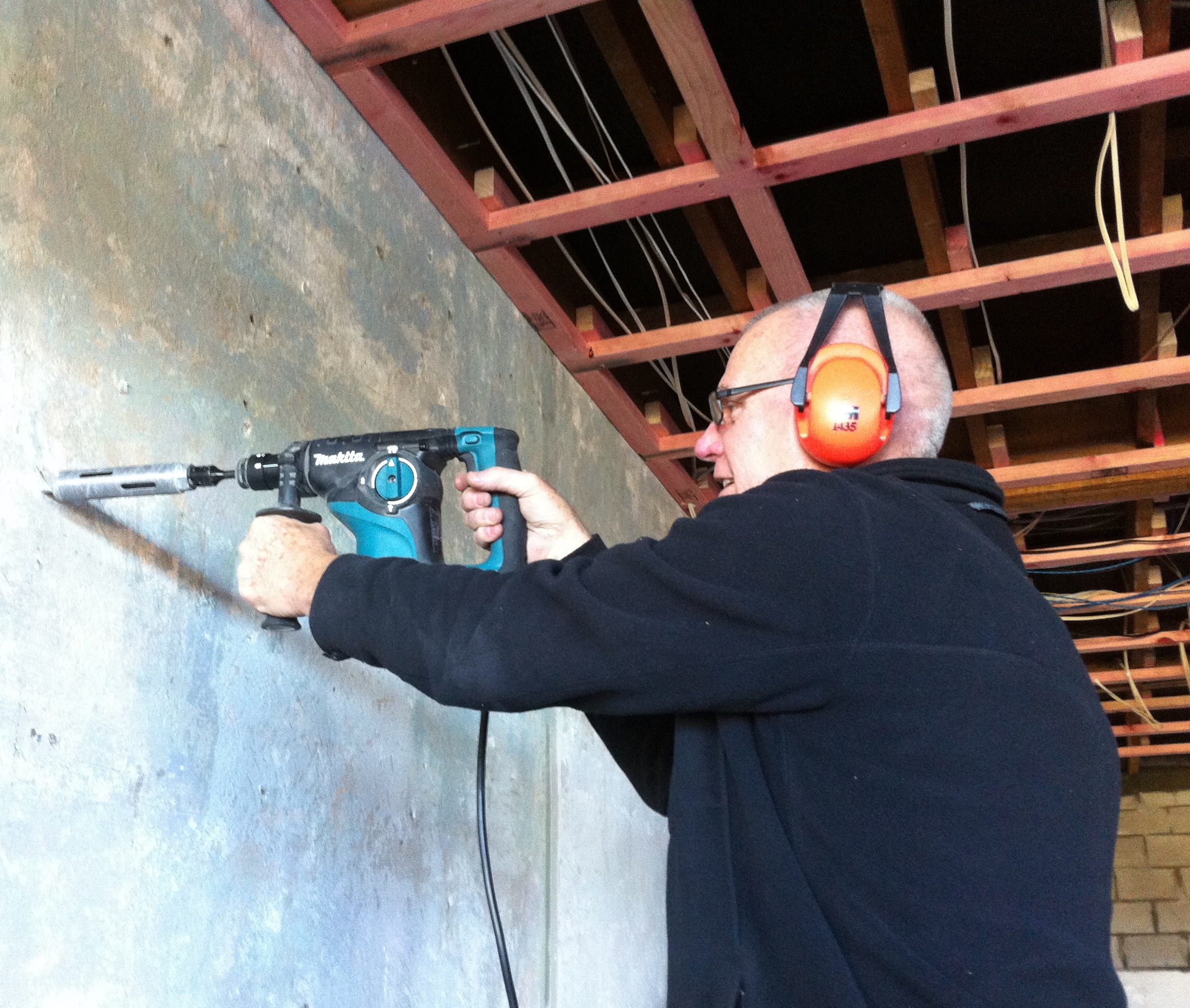

The post ACC hearing aid batteries – how to order batteries for ACC funded hearing aids appeared first on Auckland Hearing.
]]>The post Tips for the festive season – when you have a hearing loss appeared first on Auckland Hearing.
]]>Christmas is a social time, a family time. It’s nice to sit back, relax and catch up with family and friends who we haven’t seen in a while. Sometimes it’s noisy, sometimes it’s hard to hear over the kids playing, or other conversations.
Often it is helpful to sit with a wall behind you and in the centre of the table. This gives a better chance of hearing more of the conversation and not being distracted by sounds from behind. Try not to be be shy about talking to family and friends about which might be a better seat for you.
Turn the TV off and the music down during dinner. Added noise causes something called the Lombard effect – when it is noisy people talk louder. This can significantly increase the overall noise level making it quite difficult to follow conversations. Others may not even notice if you turn it down before the meal. Hearing in noise is very challenging even for people with minimal hearing losses.
Try and avoid conversations across large distances. If you need to talk, move closer, or ask that you continue later, when you can sit closer together.
Wearing your hearing aids keeps your brain and hearing system active. People who only wear their hearing aids “when they need them” tend to be the same people who are unsuccessful with hearing aids. This is because their brain never has time to adjust to hearing various sounds. If you only wear your hearing aids in noisy group situations your brain will probably find the sound over whelming – a bit like running a marathon with out doing any training.
Wearing hearing aids all the time, creates a new normal – normal to hear sounds (rather than normal to miss sounds). Your brain works out which sounds are important and which sounds are not important.
When you first get hearing aids you become very aware of all the sounds around you. The more you wear the aids the more your brain adapts, it will decide “that” sound is not important and it will no longer jump into your attention and you will no longer notice it. This process happens very quickly with the current hearing aids as they work so well.
So if your hearing aids are “in the draw” start wearing them in the few weeks coming up to Christmas. If you are not happy with the way your hearing aids are working for you, make an appointment to come in and we will set up correctly for you, so you can wear them all the time.
Remote microphones allows you to hear a person who is further away. The person you are talking to can clip on a microphone or you can placed it at the other end of the table. The microphone picks up the conversation and transmits it directly to your hearing aids. This has the effect of bringing the sound directly into your ears, removing the effect of distance.
Most hearing aids can now connect directly to an iPhone (with connecting to Android phones just around the corner). This connectivity allows your iPhone to be used as a remote microphone. You can put your phone near the person you want to listen too and hear them easily. There are many technologies available now that connect up with your hearing aids. They connect to your phone, TV, computer and sound system.
You may not hear everything that everyone says – and that’s okay. Enjoy talking to the people near you and seek out the others and talk to them later. Could you suggest you all rotate seats for dessert?
It can be hard to keep it all in perspective during Christmas festivities, especially if you feel like you are missing out on some of the fun. Try to laugh a little and be grateful for the wonderful friends and family around you. You may not hear every word they say but you can partake in all of the good feeling around the table. Enjoy the moment.
Auckland Hearing is an independent hearing aid and audiology clinic set up by Maree O’Sullivan. Maree has worked in Audiology for 20 years and started Auckland Hearing so she could focus on the needs of each client (rather than corporate profits).
We provide a full range of hearing services and work with all of the hearing aid brands that are approved by the Ministry of Health. This means we can fit the hearing aids that best suit your needs. Check out some information about hearing aid prices here

The post Tips for the festive season – when you have a hearing loss appeared first on Auckland Hearing.
]]>